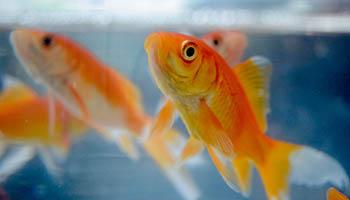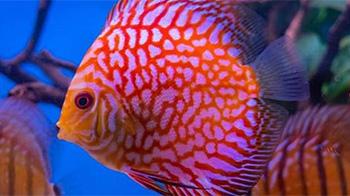Signs of healthy fish
- Good appetite – eating quickly and enthusiastically
- Breathing well – gills rising and falling rhythmically
- Behaviour – active, alert and sociable
- Eyes – bright and clear
- Fins – no sign of tears, splits, spots or streaks of blood; held away from the body, not drooping or folded
- Position – swimming freely and evenly
- Healthy scales – smooth, no sign of injury or fungal growth
Clean bottom, without stringy poo
Signs of poorly fish
- Sunken or distended bellies (except when carrying eggs)
- Sticking-out scales
- Pale patches on scales
- Tiny white spots on the fins, gills or skin
- Milky eye
- Swimming unusually – a fish either sinking to the bottom or swimming to one side is a bad sign. Some catfish do swim upside-down normally, though!
- A change in activity levels, which could indicate a temperature drop. A fish who leaves the rest of its shoal may be sick
- Oxygen starvation – a fish continuously gulping and gasping at the surface (except labyrinth species, for example, gouramis) is a sign of oxygen starvation or poor water quality
- Fungus disease (saprolegnia) – body and fins covered in white tufts. If they're around the mouth, then it's likely a different condition known as mouth fungus
- White spot disease (ichthyophthiriasis) – tiny white spots covering skin, gills and fins
- Fin rot – wasting of the tissue between fins. Not to be confused with accidental tears, which will heal on their own
- Dropsy – bloated body and protruding scales
- Swim bladder disease – loss of balance leading to the inability to swim properly
Temperature stress – if the water becomes too cold, tropical fish are known to swim slowly. If too hot, the oxygen levels will decrease, so the fish will gasp at the surface
Treating a sick fish
Most of these conditions are caused by poor water quality. If you notice any of these issues, check your water quality first. You can buy water testing kits to help with this from many pet shops or garden centres. More information on water quality and testing.
Visit Tetra for help identifying some of these fish parasites and the medications you can use.
If you need help in diagnosing and treating fish disease, please contact a specialist fish vet.
Stay in touch
Sign up to receive our emails today. Get more pet care advice, hints and tips on helping wildlife, our latest news, rehoming success stories and more directly to your inbox.




